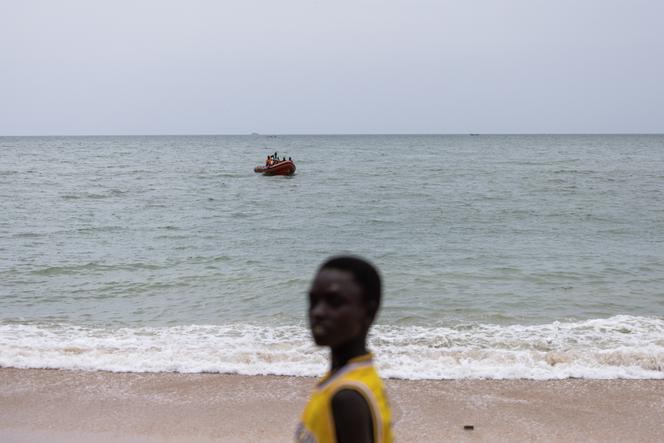


It was just past 11 am on Tuesday, September 24, when the public prosecutor at the Mbour district court, 70 kilometers south-east of Dakar, suddenly raised his voice: "It's because of people like you that we have one immigration tragedy after another," he thundered to a packed courtroom. You're killing our sons, and you want to carry on with your lives as if nothing had happened."
Opposite him in the dock, Cheikh Sow, 35, was becoming increasingly nervous. His legs were trembling. For the past hour, he had been struggling to answer the following question: Did he participate, directly or indirectly, in the organization of a migrant smuggling operation? "These people you say you sheltered for a few days; did you also guide them to a pirogue bound for Spain? "Yes...," mumbled the accused. After several minutes of heated exchanges and a shrug of the shoulders, he finally acknowledged his "responsibilities" and asked "for everyone's forgiveness."
That morning, along with Cheikh Sow, 16 defendants took the stand in various cases of "migrant smuggling," "attempted migrant smuggling" and "swindling" migrants. Given the successive tragedies of clandestine migration, this hearing had a particular resonance. The latest came on Sunday when 38 lifeless bodies were found adrift in a pirogue 70 kilometers off the coast of Dakar. The prosecutor was quick to point out: "Did you see that pirogue found adrift? That's what your actions lead to!"
Defendants, plaintiffs, representatives of the State, the judiciary... Everyone knows that clandestine departures from Mbour occur just a few hundred meters from the courthouse, mainly in the fishing district of Tefess. On September 8, at least 39 people perished when an overloaded vessel sank. Dozens more are still missing. Three days later, President Bassirou Diomaye Faye, elected on March 24, and faced with a succession of such tragedies at sea, visited the scene in support of the bereaved families. The Head of State then announced a "relentless hunt" for smugglers and the creation of a toll-free number to report them.
Cheikh Sow was arrested on September 19, after a prospective emigrant, Omar Sene, reported him. Their pirogue had been forced to disembark its passengers due to an engine problem. Questioned by the president of the court, the young exile candidate revealed everything, benefiting from the statutory principle of immunity for victims of migrant smuggling. He recounted his arrival from his native Fatick, his five-day stay with Cheikh Sow, the transfer in an old taxi to Tefess beach, the boarding on a small pirogue, then a larger one, the other passengers ("around a hundred," according to him), the confiscated mobile phones.
Not to mention the money paid: 480,000 CFA francs (€732). "He then asked me for an extra 300,000 CFA francs to be able to attempt the crossing again," said Sene. Cornered, the accused nevertheless sought the court's clemency, acknowledging that he was a link in the smuggling network, but not its main organizer. The hearing will therefore have established some chains of responsibility. Alongside Cheikh Sow, another young man, Mame Mor Ndiaye, a 22-year-old cab driver, was accused of complicity in the same traffic, for driving the would-be migrants.
"In a network, there are at least four types of profiles," explained superintendent Omar Boun Khatab Gueye, head of the National Division for Combating the Smuggling of Migrants and Related Practices (DNLT): "There are recruiters who go out to meet migrants, hosts, the organizer who collects all the money and organizes the trip, and then the captains who put together the crew of the sailing pirogue." One of the difficulties consists of catching them all at the same time.
According to DNLT, in the space of a year, the number of pirogues intercepted off the coast of Senegal has more than doubled, rising from 25 in 2023 to 61 in the first half of 2024 alone. The number of arrests of suspected smugglers leading to prosecution has also soared, from 127 in the first half of 2023 to 210 in 2024. "The phenomenon is linked to the significant increase in departures, but also to the professionalization of the Senegalese police, with seven DNLT branches now established throughout the country," said Gueye.
Under the law of May 10, 2005, migrant smuggling is an offense punishable by five to ten years' imprisonment and a fine ranging from 1 million to 5 million CFA francs (€1,524 to €7,622). "In practice, the penalties are much less severe and therefore less of a deterrent," said Mbour-based defense lawyer Oumar Sene, who advocates criminalizing migrant smuggling with a 10-year unconditional sentence: "I recently defended someone who received 120 million CFA francs [€183,000] to smuggle migrants. I can already tell you that he's not going to be stopped by six months in prison..."
In the case of Cheikh Sow, the prosecutor requested a two-year' sentence, including one year's prison time, for "attempted smuggling of migrants." And one year, including six months' imprisonment, for the young cab driver Mame Mor Ndiaye, charged with "complicity." Judgment will be announced on October 1.
Translation of an original article published in French on lemonde.fr; the publisher may only be liable for the French version.
